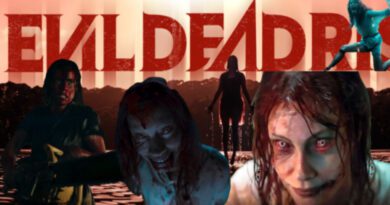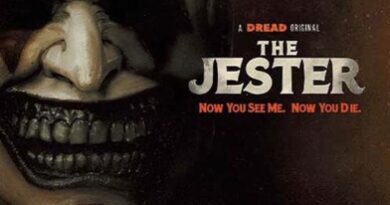2nd Generation, (Almost) 1st Class: The Black Phone Review
I have a strange hobby. Sometimes, I start watching a movie without knowing too much about it. I have a catalog of several hundred films and too little time to watch them all, so I sometimes need help remembering why I added a movie to my catalog after a particular time. So I play it blind and try, in the process, to identify which movie it is: by the plot or the actors in the more complex case or the opening credits in the more straightforward case. When I saw “The Black Phone,” I knew exactly what it was about and who to expect. But while watching it, I couldn’t help but think if, in the absence of prior knowledge, I would have been able to know precisely who was behind the story (it is related to Stephen King), which promising director took the reins (the director who is responsible for some of the successful films of the last decade or so) and who is the actor behind the creepy mask In the madness of the kidnapper (Ethan Hawke).
The answer this time is quite positive because the inspiration here is relatively straightforward, and the film only innovates a little. The good news is that these figures maintain the level, and we get one of the most successful films of 2022. All the explanations in the comprehensive review of “The Black Phone.”
King Hill (Or: Not Just “Son Of”)
“The Black Phone” is based on a short story by Joe Hill and appears in his book “20th Century Ghosts” from 2004. If the name “Joe Hill” doesn’t mean anything to you, it’s the pen name of Joseph Hillstrom King. If the name “Joseph Hillstrom King” means nothing to you, let’s say that his father’s name is Stephen King. It is challenging to be the son of the master of horror in the field when you know every story you write will be compared to your father’s. The encouraging news for Joe Hill is that the reviews and awards he has won and the fact that some of his books have been bestsellers show that he is much more than “the son of.”
Like his father, we are slowly starting to see works based on Joe Hill’s books on the big and small screen. He co-wrote “In the tall grass” with his father, which was later adapted into a reasonably mediocre Netflix horror film in which two brothers get lost in a maze of grass and encounter a variety of supernatural phenomena. A few years ago, we saw the not-bad “Horns” starring Daniel Radcliffe and Jono Temple, based on another book by Hill. In “Horns,” Radcliffe played a man who one day grew horns on his head and received supernatural abilities, which he uses to discover his girlfriend’s killer. In general, it seems that Hill likes to deal with the relationship between the “living” and the “dead,” as well as the communication between the two sides. He even wrote a story about a rather strange man, a collector of horror products, who one day decides to buy a ghost from the Internet (“Heart-Shaped Box”).
“The Black Phone” shows, at least according to the film adaptation (because I haven’t read the story yet), that Joe Hill learned something from his father. The story takes place in Denver in the late 1970s and centers around a psychopath known as “The Grabber.” The nickname is because the same person – well, you guessed it – kidnaps children and murders them.
Our hero is Finney (Mason Thames, who later said that he got the role after an audition that went through Zoom during the Corona period), who resembles other children’s characters from Stephen King’s books: he is not too accepted at school, a victim of acts of bullying. He does not see too much peace at home. His father (James Ranson) is an alcoholic with fits of rage and violence, and his mother died a few years ago. Finny lives with his little sister Gwen (Madeleine McGraw, who manages to steal the show in quite a few scenes).
Very quickly, we discover that there is something supernatural with the family. Gwen dreams realistic dreams that turn out to be accurate, which are then used to investigate the cases of disappearances, a trait that the deceased mother probably also had.
Clown Out, Magician In
In the first third of the film, we learn about the characters, the protagonist’s background, and the horror that begins to overwhelm the peaceful and very innocent Denver, even too trusting. You might expect that in a place where someone is kidnapping children, the parents would be a little more suspicious of the presence of a mysterious van or make sure the children won’t walk around alone. The feeling is that there is no responsible adult – not only in the protagonist’s family but in general. This is a theme we have learned in quite a few horror films from the 70s and 80s, including, of course, the works of Stephen King. After the first few character’s kidnappings, The Grabber also grabbed Finney.
In the process, we find out that the kidnapper acts as a magician with a black vehicle and black balloons, which help him lure children to come to him. This description may remind you of someone else from Stephen King’s books, who is a clown with red balloons that help him entice children to come to him. Joe Hill himself said that he was not influenced by the iconic character of Pennywise but by the serial killer John Wayne Gacy, who was active in the United States around the same time this film takes place. Gacy is known as “the killer clown” because, in those years, he would appear at charity events and birthdays as a figure of “Pogo The Clown.” Some say that Stephen King was influenced by him when he created Pennywise, but this may be a myth.
Regardless of the magician’s character, who is very reminiscent of that famous clown with a trade, there are a lot of points that are reminiscent of other works by Stephen King and, in general – Horror films. The film corresponds directly or indirectly with other classic works in horror cinema, for example, “Carrie”, “The Silence of the Lambs,” “Pet Cemetery,” and more. In this respect, it does not reinvent the formula. It’s a movie that’s primarily well-made, and nowadays that’s not obvious.
Keep Memorizing: Scott Derrickson
“The Black Phone” was directed by Scott Derrickson. This name might not mean too much to someone who doesn’t like to check movie credits, but the truth is that this is one of the more exciting horror directors of recent years. He wrote and directed, among other things, the excellent “The Exorcism of Emily Rose” from 2005. Beyond the fact that it perfectly combined a horror film with a legal drama, it offered several chilling scenes, including one that haunts me to this day.
In 2012 came the excellent “Sinister,” also starring Ethan Hawke, who plays a writer who discovers in his attic gruesome films in which some evil creature commits murders. “Sinister” includes one of the creepiest horror soundtracks of the last few years, especially in the video clips interspersed with it, and one of the scariest scenes I’ve seen in the cinema recently. Without revealing too much, this scene only makes me avoid mowing the lawn in the garden and watching old video tapes (well, well. The truth is that I don’t have a garden either. And the last time I saw videotapes was when I converted them to other formats during my military service As a video editor in 2007. Are there still videotapes in the world? Do they even work? And even if we have a garden in the future, is it better to buy synthetic grass instead of trying to grow natural grass?).
Let’s come back to Derrickson. In between came “Deliver Us From Evil” explained and Marvel’s “Doctor Strange,” which was successful according to the writer of these lines despite the mixed reviews he received. Derrickson was supposed to direct the Doctor Strange sequel until he pulled out of it following what was called “artistic differences” (which is usually code for “a super-serious fight between different people in the production, which resulted in her being called to the police set”). Immediately after “Doctor Strange 2” passed into other hands, Derrickson approached to make “The Black Phone.”
The film is very reminiscent of some of Derrickson’s previous works, especially when it comes to the successful use of the soundtrack or the construction of the visions of the young nurse, which reminded me of the videos from “Sinister.” Unfortunately, the soundtrack and the flashbacks are well done, but it’s not something we’ll take with us years into the future, unlike some of the previous scenes I mentioned here. This time the film almost does not include Jump Scares, for better or worse. It could be that Derrickson was applying one of the common criticisms of Malicious Spirit, which, while undoubtedly successful, involved a little too many “cheap” jump scares. Instead, “The Black Phone” is based almost entirely on the atmosphere of tension. On the one hand, it works in most cases. On the other hand, we’d be happy if there was a little more horror to go home with.
The Dead Are Calling
When Finney is kidnapped, he finds himself in a gray basement, or rather: a black one. This term not only describes the fact that there is nothing but a mattress, a small barred window, and an old black telephone, which should be disconnected in this basement. The film is impressive in its visual design, which in this case is drab and low in color, and it excellently creates the alienated claustrophobic atmosphere we expect.
At some point, the phone’s ringing breaks the silence. Finney answers and discovers that the other line is not the police, a sales center, or a request for a donation. He communicates with his dead friends, who try to help him escape the cruel fate that awaits them. A kind of mind game begins between Finny and the kidnapper, in which a large part of the tension structure is based on the fact that the protagonist tries to take steps that will bring him closer to escape without the kidnapper noticing. On the other hand, the kidnapper tries to set traps for the hero that will give him legitimacy to “break the rules,” abuse him, and possibly even kill him
Ethan Hawke’s performance of “The Bad Guy” is pretty impressive. A few years ago, Hawke said he wouldn’t play evil characters because he wanted to be remembered as “good” when he hung up his business boots. But after he passed the age of fifty, he also knows that it is very likely that you will not see him too much in the role of the charmer.
Horror artist Tom Sabini, who is partly responsible for the iconic Jason Voorhees mask on Friday the 13th and worked with the late George A. Romero on some of his zombie films, has created some impressive masks here. The masks with the image of the smiling devil and are somewhat modular. It reminded me a little of Willem Defoe, but it does the job. Hawke’s role here may seem simple because, in almost every scene, Hawke’s face is covered by a mask. They force Hawke to work hard to express the emotion using only his eyes, mouth, and tone of voice, and Hawke manages to meet the challenge. We almost believe him when he promises the boy that he won’t hurt him, and we understand his rage when the boy turns out to be a tough nut to crack. Even if “the Grabber” will not be the next horror icon, most likely, it is a villain who manages to be threatening enough to create a feeling of discomfort in us.
The Main Problems: Plot Holes And Pacing
Although “Black Phone” succeeds in creating tension, its plot has several loose ends. This may be because the film is based on a short story that became a screenplay, which Derrickson wrote with his co-writing partner for several projects, S. Robert Cargill. If, in a short story, we accept with understanding the fact that there are jumps and plot holes, in a horror film, we tend to be a little less forgiving: it is indeed lovely to use the imagination, but what can we do since the viewer has to be spoon-fed from time to time.
In this case, we need to understand how and why the heroes got their powers, and along the plot, several shortcuts or holes hurt the final result. It is difficult to understand the villain’s story and why he became like that. Although there are some hints as to why Finny is treated differently than his other kidnapped friends, this point could have been explored more. The film depicts in a good way the dynamic between the hero and his sister, with some beautiful and even moving moments. Other relationships, for example, between the hero and his classmates (according to the best tradition, there is someone the boy has a crush on but is ashamed to talk to, etc.), need to be developed more.
The fact that the plot progresses mainly through the hints the hero receives in the phone calls or the dreams the sister dreams means that it has moves that seem a bit random (“Dear Finney doesn’t know what to do to try to escape? It’s time to make another phone call!”). As I read in one of the reviews, the film is a bit reminiscent of an escape room where once the participants get stuck too much, they get a hint that they didn’t really ask from “above.” Because of what to do, you have to move forward, and the next group is already about to arrive.
Is The Black Phone Worth Watching?
Although it is far from a perfect film, especially in terms of the pace and the script, “The Black Phone” does the job overall. It will only refresh a little for those who have seen several works based on or inspired by Stephen King, such as Netflix’s Stranger Things. Is this necessarily a bad thing? Still trying to figure it out. The film shows that in the case of the King family, the balloon did not fly too far from the hand. The director is skilled, the villain character is excellent (mainly in its design, but not only), but the atmosphere also manages to attract the viewers, and all in all, the acting of most of the actors is impressive.
We would like to see the sequel if and when there is one. Joe Hill initially didn’t write a sequel yet. Still, he reportedly presented Derrickson with a “wonderfull idea,” which will likely come to fruition in the next few years given Black Phone’s overall positive hype and box office success worldwide. It will be interesting to see if the “next generation” of the “Black Phone” will correct the first film’s flaws and maybe even continue to brand Scott Derrickson and Joe Hill as the following vital creators in the world of horror.
“The Black Phone” (2022) – Full Details
Countries of Origin: United States
Director:Scott Derrickson
Cast: Mason Thames, Ethan Hawke, Madeleine McGraw, Jeremy Davies
Runtime: 103 minutes
Language: English
Budget: 16-18 Million
Box Office: USA & Canada: $90,123,230
International: $71,317,512
Worldwide: $161,440,742
Motion Picture Rating (MPAA): R
IMDB Rating: 6.9
Tomatometer: 83%







